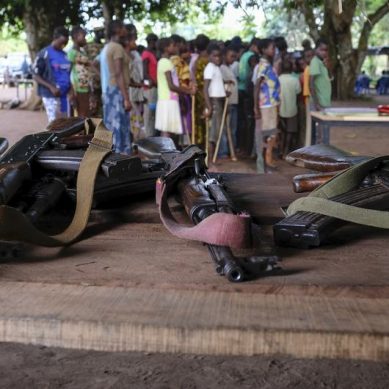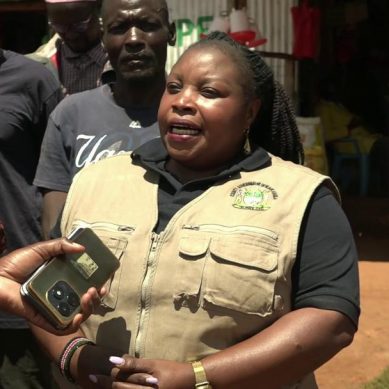
A simple definition of the term “pluralism” is “a situation in which people of different social classes, religions, clans, ethnicities, races, etc are together in a society, but continue to have different political associations, traditions, human energy systems, belonging, identities, sacred places, interests, relationships to the land, biocultural landscapes, ecologies, agroecological systems, ecosystems and land management and conservation strategies in their own environments. When this is the case, we talk of “plural society”.
Therefore, plural society is not determined by just political pluralism, which we waste a lot of time, energy and money to combat and even harm, kidnap, torture and kill each other because we want to preserve and/or protect our position in it.
It is many different types of pluralism in one reflecting different dimensions of society. The different types of pluralism are of equal importance in shaping a truly diverse, plural society.
It is ignorance, arrogance and deception to hold and pursue the thinking, belief and conviction that pluralism is achieved only in the political dimension and that political parties and elections are what you need to ensure pluralism of society. You may vote or elect a party or movement in power, which may not even be committed to political pluralism and has a long-term goal to reduce all types of pluralism in favour of power and holding onto power perennially.
Eventually, of course, the society becomes more and more closed and less and less open, with most voices in different dimensions of the environment silenced through oppression, suppression and repression, all of which may collectively involve torture, exclusive laws, exclusive policies, concealed or outright genocide, ecocide, ethnocide and intellectual death (Oweyegha-Afunaduula, 2025).
Let me list those pluralisms I am most familiar with. You can add others:
Religious pluralism
Moral pluralism
Ethical pluralism
Academic pluralism
Intellectual pluralism
Ecological pluralism
Environmental pluralism
Ecosystem pluralism
Cultural pluralism
Economic pluralism
Unfortunately, as we concentrate on “crashing” political pluralism in favour of our political ideologies, choices and actions, we are reducing the value of the other types of pluralism in the big task of building a pluralistic society for the 21st century and beyond.
Building the pluralism of society is a measure of a civilised, accommodative and caring society. We must not boast of success when we have succeeded in oppressing, suppressing and repressing other types and shades of pluralism.
When we do so we are only expressing our ignorance, arrogance and deception to satisfy our greed and selfishness as well as disregard for future generations. We might even be endangering our own genealogies, as did happen beyond Saddam Hussein genealogy in Iraq during and after his removal from power, 30 years after he grabbed the instruments of power through the barrow of the gun.
To survive in the 21st century – a century of new and different knowledge production, new communications and the environment – we must value pluralism in its different forms and shades and commit ourselves to building a pluralistic rather than a monolithic society. Such commitment requires us to be open-minded rater than closed-minded, so that we see beyond our noses and be able to explore more opportunities and possibilities than we think there are.
There are always alternatives and possibilities besides what we think, believe and are convinced are the alternatives and the possibilities. Thus, our world is a world of diverse opportunities, possibilities and alternatives.
We only restrict them, often to satisfy our egos, greed and selfishness. We are just short-sighted and ignorant of the fact that we are integral to the life-death cycle, which dictates that all of us are in the life component for varying short life-spans.
It is true. Pluralism opens avenues for new opportunities, possibilities and alternatives in all spheres of human endeavours and human life. Anyone who spends time, energy and money working to reduce pluralism of opportunities, possibilities and alternatives ends up being a saboteur of an institution, country and people or development, transformation and progress and, therefore, a burden to a nation.
One will suffer from short-sightedness and is likely to focus one’s mind on power, things, money, riches, glory, domination, exploitation or siphoning off of resources for self-gratification.
One’s tools of leadership and governance will be jerrymandering, hoodwinking, denials, corruption, deception, lies, violence and exclusion of alternative leaders from power by denying them money, political space and interaction with the electorate or restricting them to the headquarters of their political parties.
One will use laws to retain and consolidate power at the expense of development, transformation and progress of one’s country and people. One is likely to promote hereditary political and military leadership to protect one’s power base as long as one can. One will use elections just to hoodwink the people and those outside the country who spur one on.
There will be no progress unless the burden is removed. The more time it takes a country and people to remove the burden the more the country and people suffer the consequences of lack of pluralistic thinking, pluralistic wisdom, pluralistic understanding and pluralistic insights in all spheres of human endeavour and life. It is conditions like these that favour vices such as violence, genocide, ecocide, ethnocide and intellectual death (e.g., Oweyegha-Afunaduula, 2025) and apartheid-style governance in a country.
Constitutionalism will be converted to a roadblock to power rather than a tool for building democracy, justice and freedom in a country. The boundaries between the Executive, Legislature and Judiciary will disappear with executive swallowing the legislature and judiciary. Political militarism will predominate in the political sphere of human endeavour.
Humanity has no shortage of crises in all dimensions of the environment (ecological-biological, socio-economic, sociocultural and temporal), spheres of human endeavour and spheres of human life because increasing disregard for pluralism of society, thinking and actions to address them.
We have leadership and governance crises, resource-use crises, time-use crises, energy-use crises, cultural crises, development crises, moral crises, academic crises, intellectual crises, ethical crises, spiritual crises, social crises, economic crises, political crises, environmental crises, ecological crises, constitutional crises, legal crises, legislative crises, judicial crises, to name but a few, because they disregard for pluralism in favour of monolithism.
Virtually all of the of the crises have their bases and or origins in the environment; more precisely in the different dimensions of the environment: the ecological-biological dimension, the socio-economic dimensions, socio-cultural dimension and time or temporal dimension. To value the environment means acknowledging pluralism in its diverse types in its different dimensions. Failure to do so is the beginning of failure.
Many so-called failed states are poor at acknowledging pluralism in its diverse types and the diverse environmental dimensions. Their rulers emphasise exclusive power, richness, glory and attach no time to the enjoyment of power, preferring to rule for life. They will corrupt everything, including society, for power, richness and glory. They will erode institutionalism, constitutionalism and justice with little or no thought about the long-term consequences. Pluralism is an anathema to them – in employment and in services. They will tune everything, including constitutional, executive, legislative, judicial, academic and intellectual processes, to power to the detriment of their countries and people’s development, transformation and progress.
As a consequence, instead of steadying their countries and people on the road to the 22nd century, they take them back to the 20th century when violence and greed resulted in global genocide, ecocide, ethnocide and intellectual death undermine development.
Let me end this article by saying something about environmental pluralism, which is declining in Uganda, along the other pluralisms, as political militarism takes centre stage in the leadership and governance of the country. It will be difficult for Uganda to fit in the 21st and beyond as a dev eloped, transformative and progressive country if its leaders and governors continue to reduce political pluralism, all pluralisms, and especially to ignore environmental pluralism.
Environmental pluralism is a philosophy that acknowledges and incorporates a variety of environmental values, perspectives, and stakeholders in environmental decision-making. It seeks to move beyond a singular, dominant vision of the environment by embracing diversity and acknowledging the multifaceted nature of ecological problems. This approach encourages the inclusion of diverse voices, perspectives, and knowledge systems in addressing environmental issues.
Acknowledging the many different values people hold and their emotional and moral dimensions, might first seem extremely complex, but in the long run it is an absolute necessity for making sustainable policy decisions.
In Uganda we are witnessing environmental pluralism reduced by encouraging the spread of the grass-cow culture of the nomadic pastoral human energy system. Through what appeared to be tolerated by the National Resistance Movement Regime (NRM), members of this human energy system, some coming from as far as Rwanda, Tanzania and the Mulenge area of the Democratic Republic of Congo (DRC) are grabbing land everywhere, destroying our agroecological systems and natural ecosystems to establish gazing systems where nature supported settled peoples in relation to the natural environments. As if this is not enough, the NRM regime is has encouraged establishing and is continuing to encourage establishing of plantations of sugarcane and oil palm.
Sugarcane is definitely a grass. Oil palm is also a grass type, although it looks like a tree. Bugala Island of Kalangala District in Lake Victoria has lost 10,000 hectares of natural forest to oil palm. Bugoma Forest wildlife-migratory corridor has lost several hectares of land to sugarcane. A large portion of northern Uganda has lost several hectares of land to sugarcane. All these phenomena have taken place under the governance of the NRM regime. They display to what extent Uganda is suffering decline in environmental pluralism.
Northern Uganda is now burdened by nomadic pastoralists with thousands of heads of cattle, who are reducing the environmental pluralism of ecosystems in favour of their cattle. Busoga is currently being invaded by the oil palm grass, which is being cast as development, but it is reducing the environmental pluralism of the area, particularly its agroecological systems. This is likely to increase food security problems in Busoga. There is fear everywhere in Uganda that the NRM regime is abetting land grabbing by nomadic pastoralists from elsewhere because the main governors of the country belong to the nomadic-pastoral human energy system.
Some critical observers of the Ugandan socio-political scene argue that there might be a long-term plan by the NRM regime to facilitate take over of land previously and still dominated by settled peoples for the benefit of the nomadic-pastoral human energy system.
Environmentally speaking, if this is the case, reducing all the biocultural landscape to the grass culture of nomadic pastoralism will lead to widespread environmental decay and collapse due to recession of environmental pluralism. That will take Uganda closer to becoming part of the Sahara Desert, which is advancing southwards. The owners of the country, the indigenes belonging to natural indigenous groups of Uganda, will end up being confined to ecologically poor areas just like was the case in apartheid South Africa before its collapse in the early 1990s.
If this is what is likely to happen, then the country will surely have been placed under apartheid-type governance.
In conclusion, if Uganda is to survive in the 21st century and beyond as self-sustaining country, it must value pluralism in its widest sense, but in particular environmental pluralism. This is because the more pluralistic the environment is the more survival is assured in all the dimensions of the environment: ecological-biological dimension, socioeconomic dimension, sociocultural dimension and time or temporal dimension. The governors of the country should have the survival of the future generations of the indigenes of Uganda in their cultural and genetic diversity. If they don’t, they should not consider themselves as successful governors, because by the time their governance of the country they will have just sown seeds of disintegration, violence, genocide, ecocide and ethnocide, accompanied by intellectual death. This will cast the National Environmental Management Authority (NEMA) as an environmental toothless bulldog presiding over environmental decay in all the dimensions of the environment in our time. It will be as if NEMA was established interests that are anti-environmental pluralism, anti-ecopluralism and erosive of all other types of pluralism.
For God and my country
- A Tell report / By Oweyegha-Afunaduula / Environmental Historian and Conservationist Centre for – Critical Thinking and Alternative Analysis (CCTAA), Seeta, Mukono, Uganda.
About the Centre for Critical Thinking and Alternative Analysis (CCTAA)
The CCTAA was innovated by Hyuha Mukwanason, Oweyegha-Afunaduula and Mahir Balunywa in 2019 to the rising decline in the capacity of graduates in Uganda and beyond to engage in critical thinking and reason coherently besides excellence in academics and academic production. The three scholars were convinced that after academic achievement the world outside the ivory tower needed graduates that can think critically and reason coherently towards making society and the environment better for human gratification. They reasoned between themselves and reached the conclusion that disciplinary education did not only narrow the thinking and reasoning of those exposed to it but restricted the opportunity to excel in critical thinking and reasoning, which are the ultimate aim of education. They were dismayed by the truism that the products of disciplinary education find it difficult to tick outside the boundaries of their disciplines; that when they provide solutions to problems that do not recognise the artificial boundaries between knowledges, their solutions become the new problems. They decided that the answer was a new and different medium of learning and innovating, which they characterised as “The Centre for Critical Thinking and Alternative Analysis” (CCTAA).For God and my country.
Further reading
Brennan, Andrew (1992). Noral Pluralism and the Environment. Environmental Values Vol, pp. 15-33 (19 pages) Published By: Sage Publications, Ltd.
Curry, Patrick. “Re-Thinking Nature: Towards an Eco-Pluralism.” Environmental Values 12, no. 3 (2003): 337–60. doi:10.3197/096327103129341351.
Isacs, L., Kenter, J.O., Wetterstrand, H., Katzeff, C. 2022. What does value pluralism mean in practice? An empirical demonstration from a deliberative valuation. People and Nature, https://doi.org/10.1002/pan3.10324
Kanie, Norichika (2013). Green Pluralism: Lessons for Improved Environmental Governance in the 21st Century. Earth System Governance, https://www.earthsystemgovernance.org/publication/green-pluralism-lessons-for-improved-environmental-governance-in-the-21st-century/ Visited on 17 May 2025 at 15:34 pm EAT.
Minteer, Ben A. and Robert E. Manning (1999) Pragmatism in Environmental Ethics
Democracy, Pluralism, and the Management of Nature. Volume 21, Issue 2, Summer 1999
Pages 191-207 https://doi.org/10.5840/enviroethics199921231 https://www.pdcnet.org/enviroethics/content/enviroethics_1999_0021_0002_0191_0207 Visited on 17 May 2025 at 18:28 pm EAT
Öhman, Johan (2006). Pluralism and criticism in environmental education and education for sustainable development: a practical understanding, DIVA, https://www.diva-portal.org/smash/record.jsf?pid=diva2%3A136413&dswid=-892 Visited on 17 May 2025 at 18:43 pm EAT.
Oweyegha-Afunaduula (2023). Does Environmental Justice Matter anymore in Uganda? The Kampal Report, May 30 2023, https://www.thekampalareport.com/talk-back/opinions/2023053027503/oweyegha-afunaduula-does-environmental-justice-matter-anymore-in-uganda.html Visited on 16 May 2025 at 12:51 pm EAT.
Oweyegha-Afunaduula (2025). From Genocide to Ecocide to Ethnocide to Intellectual Death. Uganda Radio Network, 20 January 2025. https://ugandaradionetwork.com/s/uganda-from-genocide-to-ecocide-to-ethnocide-to-intellectual-death/ Visited on 18 May 2025 at 09:35 am EAT.
Pon Melissa (2022). On Ethics, Colonialism, Pluralism and ecological crisis. Earth.fm October 14 2022. https://earth.fm/interviews/on-ethics-colonialism-pluralism-and-environmental-crises-an-interview-with-interdisciplinary-artist-and-field-recordist-kim-v-goldsmith/ Visited on 17 May 2025 at 15:44 pm EAT
Schlosberg, David (1999).Environmental Justice and the New Pluralism: The Challenge of Difference for Environmentalism. Oxford University Press. Bokus, https://www.bokus.com/bok/9780199256419/environmental-justice-and-the-new-pluralism/?srsltid=AfmBOooAmXKD-09bjqCK_JiJQr1u1MuWPeA4Iys9o3sCJK_NVR0Eldg0 Visited on 17 May 2025 at 18
:57 pm EAT
Schnegg, Michael ( ). Chapter 1. Environmental Pluralism Knowing the Namibian Weather in Times of Climate Change. Berghahn Books, https://www.berghahnbooks.com/downloads/OpenAccess/EriksenCooling/EriksenCooling_01.pdf Visited on 17 May 2025 at 14:30 pm EAT.
Smith, Graham Martin (1997) Pluralism, deliberative democracy and environmental values. University of Southampton, Doctoral Thesis. http://eprints.soton.ac.uk/id/eprint/463048 https://eprints.soton.ac.uk/463048/ Visited on 17 May 2025 at 18:39 pm EAT
Spash, Clive L. (2009). The New Environmental Pragmatists, Pluralism and Sustainability. Environmental Values Vol. 18, No. 3 (August 2009), pp. 253-256 (4 pages) Published By: Sage Publications, Ltd.
Stockholm Resilience Centre (2022). To Value the Environment Means acknowledging Pluralism. Stockholm University, 8 September 2022 https://www.stockholmresilience.org/research/research-news/2022-09-08-to-value-the-environment-means-acknowledging-pluralism.html Visited on 17 May 2025 at 15:14 pm EAT.
Tryggvason, Á., Öhman, J., & Van Poeck, K. (2023). Pluralistic environmental and sustainability education – a scholarly review. Environmental Education Research, 29(10), 1460–1485. https://doi.org/10.1080/13504622.2023.2229076
Tryggvason, Ásgeir and Öhman, Johan (2024). Pluralism and democracy in environmental and sustainability education. Orebro University. https://oru.diva-Visited on 17 May 2025 at 15:39 pm EAT.portal.org/smash/record.jsf?pid=diva2%3A1847404&dswid=5769
Turnhout, Esther (2024). A better knowledge is possible: Transforming environmental science for justice and pluralism. Knowledge, Transformation & Society University of Twente, https://research.utwente.nl/en/publications/a-better-knowledge-is-possible-transforming-environmental-science Visited on 17 May 2025 at 18:32 pm EAT.
Ulutürk, Anıl (2024). Callicott And the Issue of Pluralism in Environmental Ethics. A. Ulutürk, “Callicott and The Issue of Pluralism in Environmental Ethics,” Ph.D. – Doctoral Program, Middle East Technical University, 2024.
Uzzell, David L. (2019). Environmental pluralism and participation: a co-orientational perspective. In: Valued Environments, Taylour & Francis Group, https://www.taylorfrancis.com/chapters/edit/10.4324/9780429199868-11/environmental-pluralism-participation-co-orientational-perspective-david-uzzell Visited on 17 May 2025 at 14:47 pm EAT.
Wijdicks, Eelco F. M. (2007). Intellectual death is not Brain Death. American Journal of Respiratory and Critical Care Medicine, Volume 176, Issue 6 https://www.atsjournals.org/doi/full/10.1164/ajrccm.176.6.625a Visited on 18 May 2025 at 09:46 am EAT.
Wisdom Library (2024). Intellectual Death: Significance and Symbolism. Wisdom Library, 2 December 2024, https://www.wisdomlib.org/concept/intellectual-death Visited on 18 May 2025 at 09:258 am EAT.







